Israel 'to intensify Gaza attacks'
- Published
The civilian death toll in Gaza is rising, as Yolande Knell reports
Israeli PM Benjamin Netanyahu has vowed to "further intensify attacks on Hamas" in the Gaza Strip, following talks with his defence chiefs.
He said the Palestinian militants would "pay a heavy price" for their rocket attacks on Israel.
Israel's military said Hamas had fired 82 rockets at Israeli cities on Wednesday, after dozens of overnight air strikes in Gaza.
Some 50 Palestinians are reported to have died in the recent hostilities.
Israel says its targets have been militant fighters and facilities including rocket launchers, weapons stores, tunnels and command centres.
Gaza medical officials say half of the casualties were civilians, including women and children.
Hamas said that all Israelis were now targets, accusing Israel of violating the Egyptian-brokered truce that ended exchanges in 2012.
The UN Security Council is due to meet on Thursday to discuss the crisis, diplomatic sources have told Reuters news agency.
Guests at an Israeli wedding in Holon rushed for cover as rocket sirens sounded
Ground offensive possible
Mr Netanyahu said operations in Gaza would continue until firing against Israeli targets stopped.
Israeli President Shimon Peres told CNN, external that a ground offensive might happen "quite soon". The army has called up about 40,000 reservists.
The military said its Iron Dome missile defence system had intercepted 21 of the 82 rockets fired on Wednesday, including three above Tel Aviv, three over Ashkelon and three over Ashdod.
It said three missiles were launched toward the southern city of Dimona and its nuclear reactor. Two fell near the town, while a third was intercepted.
The town of Hadera 100km (60 miles) north of Gaza, was hit with an M-302 surface-to-surface rocket, the furthest target so far reached.
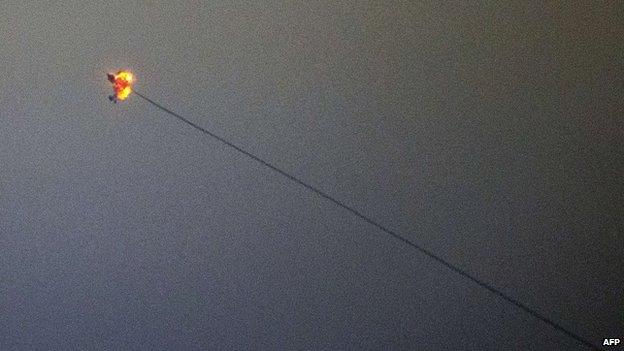
The Israeli military says its missile defence system shot down a rocket near the town of Dimona
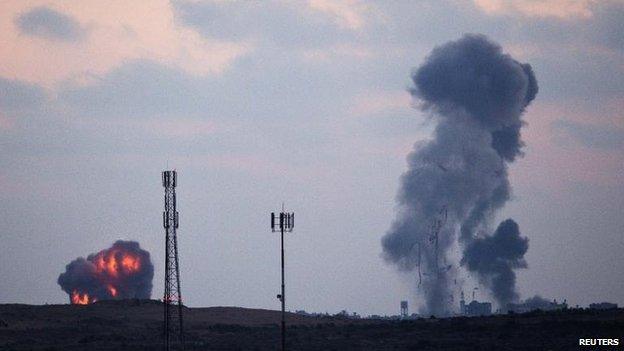
Israel said it had hit dozens of "terror sites" in Gaza
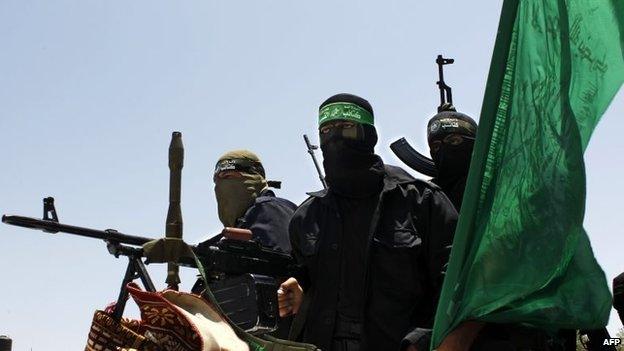
The military wing of Hamas has vowed that Israel will pay a "tremendous price" for the air strikes
The Israeli military added that it had carried out 129 air strikes in Gaza on Wednesday.
It brings to 550 the number of sites in Gaza attacked as part of Operation Protective Edge.
Gaza health official Ashraf al-Kedra told AFP news agency that Israeli air strikes on Wednesday had killed four Palestinians in Shejaiya and two in Zeitun and two more in Beit Hanoun.
The head of the Palestinian Centre for Human Rights in Gaza, Raji Sourani, accused Israel of deliberately targeting civilians.
He told the BBC: "There is no safe haven in this place and Palestinian civilians are once again in the eye of the storm and are paying heavily. Israelis are trying to pressure militant groups through targeting civilians."
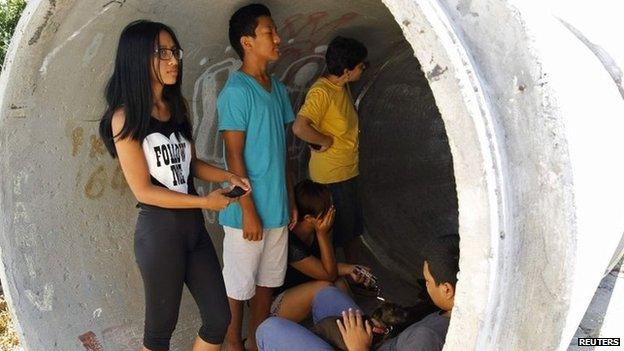
Schools and summer camps in southern Israel have been closed because of the threat of rocket fire

Analysis by the BBC's Kevin Connolly in Jerusalem
As the military temperature rises, it becomes harder to see what the shape of any endgame between Israel and Gaza might look like.
Hamas will find it difficult to walk away from this round of conflict without something to persuade its own people that the death and destruction in Gaza has achieved something. It will want prisoners released as part of a deal. Israel will be reluctant.
The pressure of public opinion too weighs on Israel, which has talked in terms of a final end to the rocket threat from Gaza. That's a tall order when Israel itself estimates that Hamas has a stockpile of 10,000.
Such cycles of conflict have ended in the past of course - as recently as November 2012 - but for now the talk is of deterioration, when last week the buzzword was de-escalation. Egypt's intelligence services remain a possible go-between but for now there appear to be no moves towards peace. When an Israeli cabinet minister was asked if there were any, he said simply: "Not now."

'Dismantle Hamas'
The leaders of France and Germany condemned the attacks on Israel after speaking to Mr Netanyahu on Wednesday.
US Secretary of State John Kerry also spoke with the Israeli PM and planned to next hold talks with Palestinian Authority President Mahmoud Abbas, a state department spokeswoman in Washington said.
US officials had been "encouraging all sides to de-escalate the situation", she added.
However, Mark Regev, spokesman for Mr Netanyahu, earlier confirmed that the situation was more one of escalation than de-escalation.
He told the BBC the Israeli army was acting to "dismantle Hamas's military machine".
An Israeli government adviser explains what the collapse of peace talks reveal about the future.
Osama Hamdan, spokesman for the Palestinian group Hamas, told BBC HARDtalk that the ceasefire could be restored
"We don't want to have some sort of band-aid solution whereby we have a quick fix, a ceasefire and then we only have rockets on Israeli citizens next week," he said.
The leader of Hamas' political bureau, Khaled Meshaal, warned that Hamas would continue to retaliate and called on Palestinians to unite.
He also criticised what he described as the international community's lack of support for the Palestinian people.
"This war was forced upon us," he said in a televised speech on Wednesday.
Last month, Hamas and Mr Abbas formed a unity government to end a major rift between factions in the West Bank and Gaza.
Israel suspended crisis-hit peace talks with the Palestinians in April in response to the announcement of the reconciliation deal.

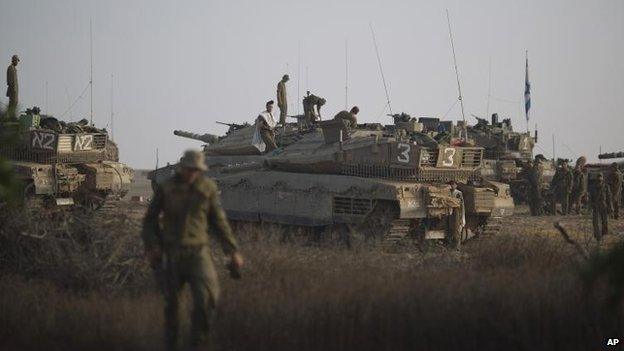
Israeli soldiers have been deployed to reinforce the Gaza border
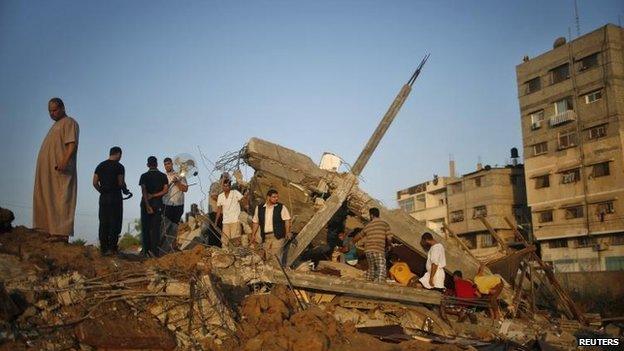
Palestinians in Gaza City survey the rubble of a house targeted in an Israeli air strike
Tensions rose last week with the murders of three young Israelis in the occupied West Bank and a Palestinian teenager in Jerusalem.
Israel says Hamas was behind the abduction and murder of the Israeli youths - a claim it denies.
A day after their funerals, the Palestinian youth was abducted in East Jerusalem and murdered. Police have arrested six Jewish suspects and say it seems the 16-year-old was killed because of his nationality.

Israel's Iron Dome missile shield
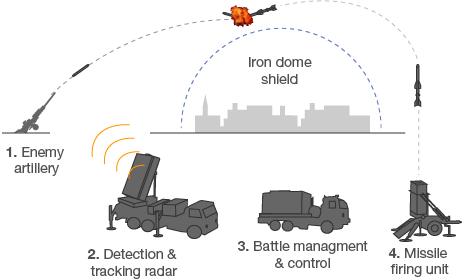
Enemy fires missile or artillery shell
Projectile tracked by radar. Data relayed to battle management and control unit
Data analysed and target co-ordinates sent to the missile firing unit
Missile is fired at enemy projectile